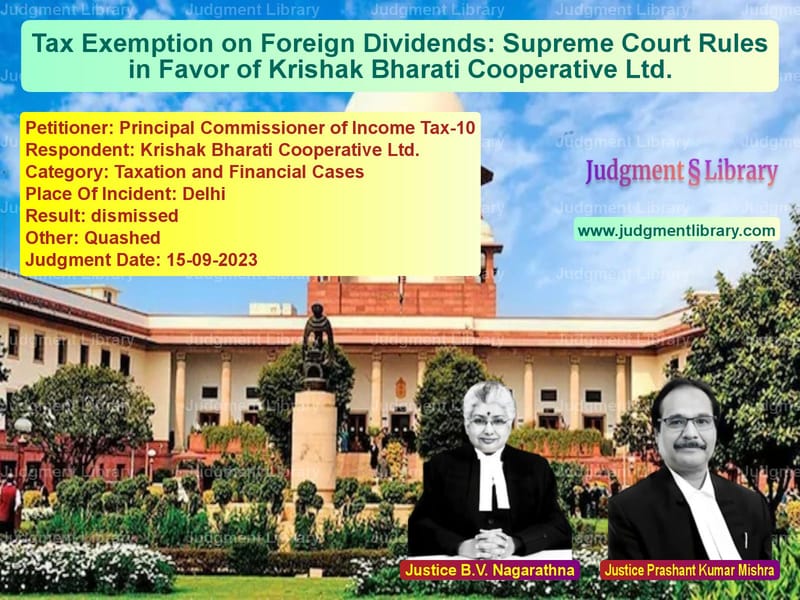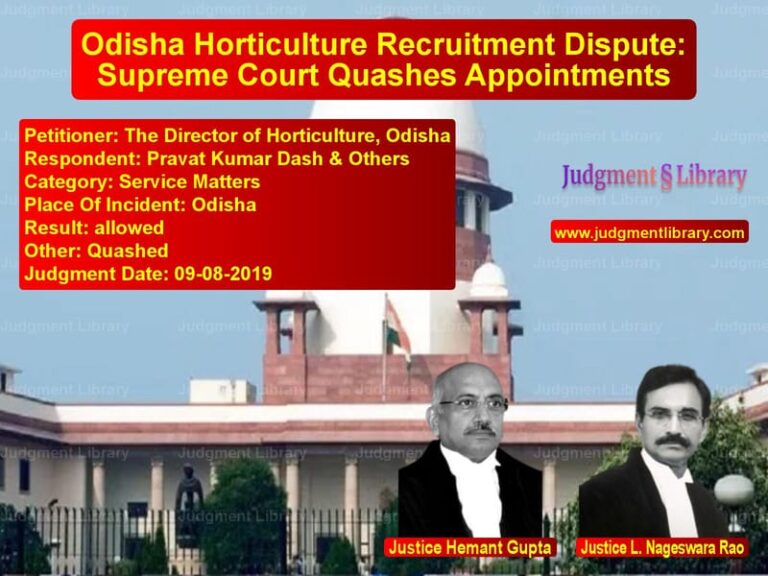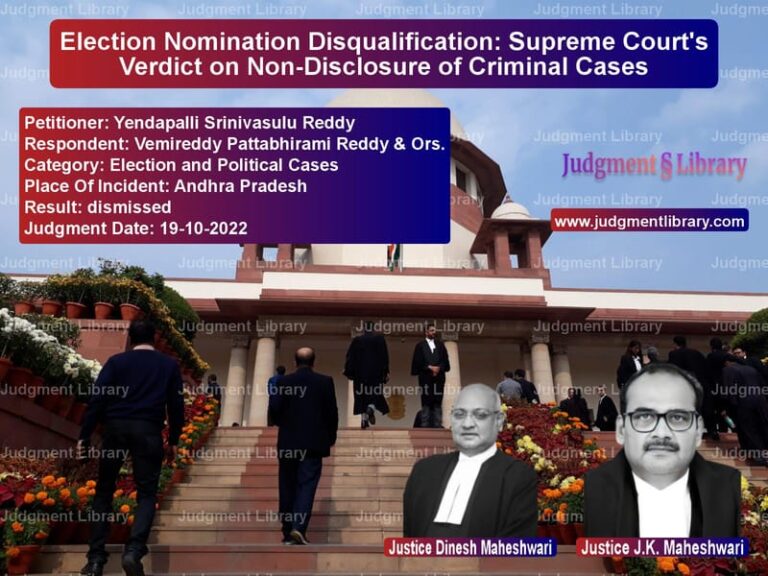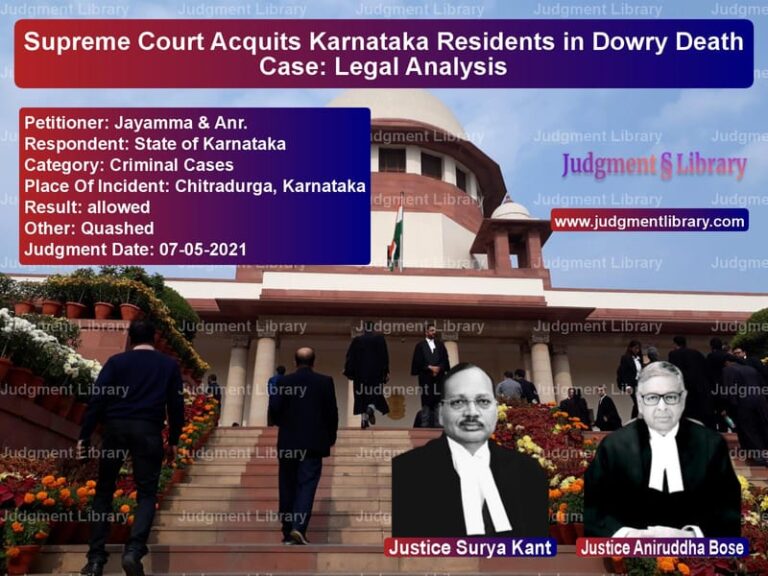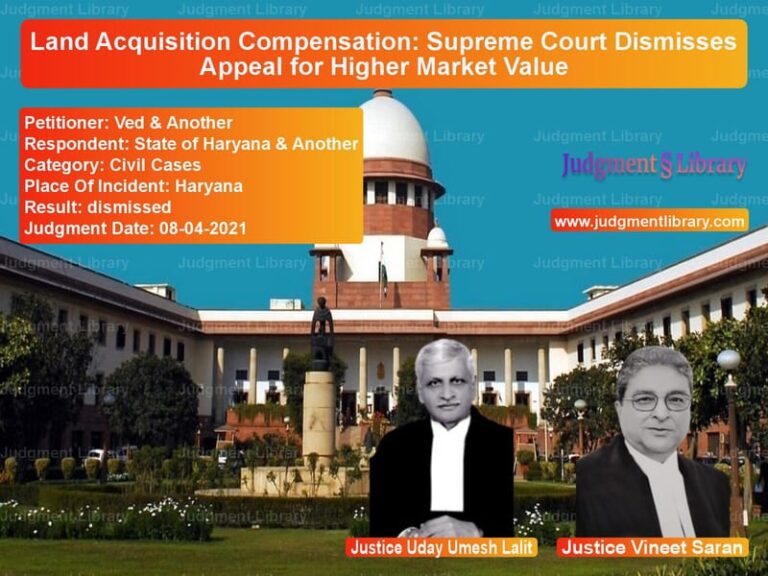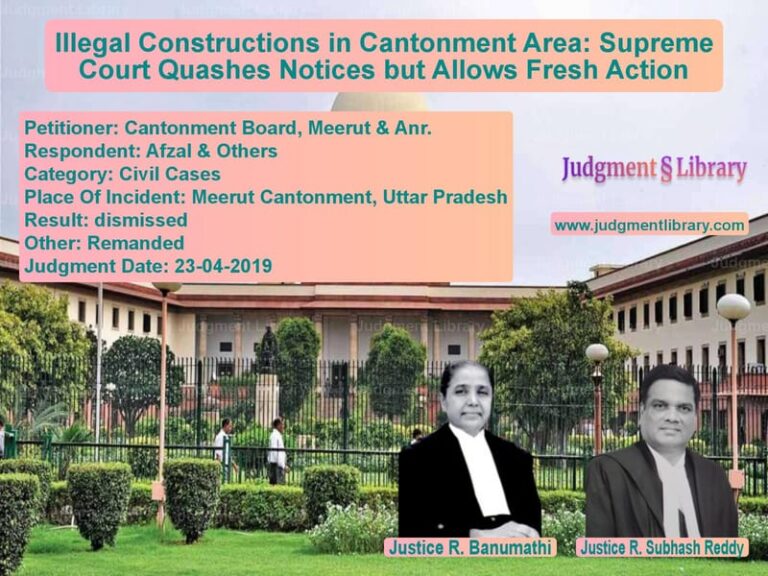Tax Exemption on Foreign Dividends: Supreme Court Rules in Favor of Krishak Bharati Cooperative Ltd.
The Supreme Court of India recently delivered a crucial judgment in the case of Principal Commissioner of Income Tax-10 vs. Krishak Bharati Cooperative Ltd., where the Court ruled in favor of the assessee, holding that tax exemption on foreign dividends under the India-Oman Double Taxation Avoidance Agreement (DTAA) is valid. The ruling reinforces the principle that tax treaties must be honored and that businesses are entitled to benefits under international agreements.
The Court dismissed the appeal filed by the Income Tax Department, affirming the Delhi High Court’s decision that allowed Krishak Bharati Cooperative Ltd. (KRIBHCO) to claim tax exemption on dividend income received from its joint venture in Oman. The judgment clarifies the interpretation of tax treaties and ensures that businesses investing in foreign countries can benefit from tax incentives provided by the host nation.
Background of the Case
KRIBHCO, a multi-state cooperative society engaged in fertilizer manufacturing, had invested in a joint venture in Oman, Oman India Fertilizer Company SAOC (OMIFCO). The joint venture was established under Omani law, and KRIBHCO held a 25% share in the entity. The company received dividend income from OMIFCO, which was exempted from taxation in Oman under Article 8(bis) of the Omani Tax Laws.
Key Legal Dispute:
- KRIBHCO claimed tax exemption in India on the dividend income under Article 25 of the India-Oman DTAA.
- The Income Tax Department contended that since no actual tax was paid in Oman, KRIBHCO was not entitled to exemption under the DTAA.
- The Principal Commissioner of Income Tax (PCIT) issued a notice under Section 263 of the Income Tax Act, 1961, to disallow the exemption.
- The Income Tax Appellate Tribunal (ITAT) ruled in favor of KRIBHCO, holding that the tax exemption granted in Oman should be considered equivalent to actual tax paid.
- The Delhi High Court upheld the ITAT ruling, leading to the present appeal by the tax department.
Key Legal Issues Considered
- Whether tax exemption granted in Oman can be considered as ‘tax paid’ for the purpose of claiming a tax credit in India.
- Whether Article 25(4) of the India-Oman DTAA allows credit for tax that would have been payable in Oman but was exempted as an investment incentive.
- Whether the Income Tax Department had the authority to override the provisions of an international tax treaty.
Petitioner’s Arguments (Income Tax Department)
The Income Tax Department, represented by senior counsel, argued that:
- The DTAA only allows tax credit for actual tax paid in the foreign country, not for tax that is merely exempted.
- KRIBHCO did not pay any tax in Oman, and therefore, it could not claim an exemption in India.
- Article 11 of the DTAA, which deals with dividend taxation, does not provide for a complete exemption if no tax is paid in the source country.
- The letter issued by the Oman Ministry of Finance granting the exemption lacked statutory authority.
Respondent’s Arguments (KRIBHCO)
KRIBHCO, represented by its legal counsel, contended that:
- Under Article 25(4) of the DTAA, tax payable in Oman includes tax that would have been paid but for the exemption.
- The Omani government granted the exemption as part of an economic policy to attract foreign investment.
- The exemption letter from the Oman Ministry of Finance was issued under legitimate legal provisions and could not be disregarded.
- For over a decade, similar exemptions had been granted and accepted by Indian tax authorities without dispute.
Supreme Court’s Analysis
The Supreme Court examined the DTAA provisions and found that:
- Article 25(4) explicitly includes tax incentives as part of the tax payable in a contracting state.
- India and Oman agreed to recognize tax exemptions provided by either country as valid for the purpose of avoiding double taxation.
- The Income Tax Department had no authority to disregard the DTAA provisions and impose additional tax liability on KRIBHCO.
- The Omani government’s exemption was designed to promote economic development, and Indian businesses were entitled to benefit from this incentive.
The judgment observed:
“The provisions of DTAA must be interpreted in a manner that furthers the objective of avoiding double taxation and promoting cross-border investments.”
Regarding the tax exemption granted by Oman, the Court stated:
“If a tax is exempted by the source country as an incentive for foreign investors, it cannot be treated as nonexistent for the purpose of granting tax relief in the residence country.”
Final Judgment
The Supreme Court dismissed the Income Tax Department’s appeal and upheld the Delhi High Court’s ruling, holding that:
- KRIBHCO was entitled to claim tax exemption under the India-Oman DTAA.
- Oman’s tax exemption on dividends was valid for the purpose of computing tax credit in India.
- The Income Tax Department could not override the provisions of an international treaty.
- The ITAT’s decision in favor of KRIBHCO was legally sound and must be upheld.
The Court concluded:
“The revenue’s attempt to deny treaty benefits contradicts the settled principles of international taxation and the legislative intent behind the DTAA.”
Implications of the Judgment
- Strengthens the enforceability of DTAA provisions in India.
- Prevents the Income Tax Department from arbitrarily denying tax benefits granted under international agreements.
- Encourages Indian businesses to invest in foreign countries with confidence in tax treaty protections.
- Ensures that businesses benefit from legitimate tax exemptions offered by foreign governments.
Conclusion
The Supreme Court’s ruling in this case is a significant victory for businesses investing abroad under tax treaties. By affirming the validity of tax exemptions under the India-Oman DTAA, the Court has reinforced the principle that international agreements must be honored in good faith. The judgment ensures that Indian companies investing overseas can rely on tax treaty protections without fear of arbitrary taxation by domestic authorities.
Petitioner Name: Principal Commissioner of Income Tax-10.Respondent Name: Krishak Bharati Cooperative Ltd..Judgment By: Justice B.V. Nagarathna, Justice Prashant Kumar Mishra.Place Of Incident: Delhi.Judgment Date: 15-09-2023.
Don’t miss out on the full details! Download the complete judgment in PDF format below and gain valuable insights instantly!
Download Judgment: principal-commission-vs-krishak-bharati-coop-supreme-court-of-india-judgment-dated-15-09-2023.pdf
Directly Download Judgment: Directly download this Judgment
See all petitions in Income Tax Disputes
See all petitions in Tax Evasion Cases
See all petitions in Banking Regulations
See all petitions in Judgment by B.V. Nagarathna
See all petitions in Judgment by Prashant Kumar Mishra
See all petitions in dismissed
See all petitions in Quashed
See all petitions in supreme court of India judgments September 2023
See all petitions in 2023 judgments
See all posts in Taxation and Financial Cases Category
See all allowed petitions in Taxation and Financial Cases Category
See all Dismissed petitions in Taxation and Financial Cases Category
See all partially allowed petitions in Taxation and Financial Cases Category

